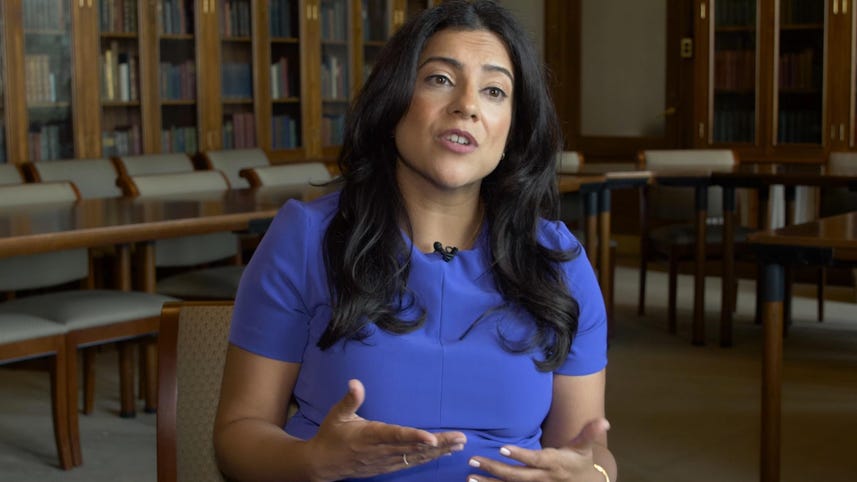
In 1995, 37% of the technology workforce was female.
And today that number is less than 20%.
So at a time where technology is changing everything about the way that we live and work, we're losing girls.
[MUSIC]
I'm definitely a troublemaker, I feel like what's the point of having a platform If you're not gonna use it, to speak truth to power.
I'm Reshma Saujani the CEO and founder of Girls Who Code and the author of brave not perfect.
[MUSIC]
Girls Who Code is a national movement to close the gender gap in computer science and technology.
In 2012.
We started with 20 girls.
We have now reached 185,000 girls In all 50 states, we have 6000 Girls Who Code clubs that are happening in community centers and schools and churches and mosques.
Every minute, every hour that goes by another young girl is learning how to code in one of our Programs.
And we are building a global movement.
This year we are launching Girls Who Code clubs in the UK, and Canada, and in India.
I am a weird person to have built this movement, because I'm not a coder.
And so I majored in poly science and speech communications.
But my family came here as refugees and you know my parents were actually engineers and that's one of the only reasons in many ways that they got sad is to come to this country and so like i knew that like if you got a good job if you had a shot in education that you could march up into the middle class because i saw my family do that.
And so when I ran for congress in 2010, and I lost miserably, and I remember I would go into schools and I would see rows and rows of boys learning how to code, not a girl in sight.
And so when I lost and I thought about what's the one thing that I can do to actually change the lives.
Of girls in this country, this was that it was teach them to code.
And so I launched Girls Who Code as a way to really close the poverty gap and I went Merica as a way to like close the innovation gap in America.
And as a way to make sure that every young girl truly has access to the American dream.
And so every day we are putting more young women in the pipeline, encouraging more young women to go into this field, seeing more women major or minor in computer science, in the hopes that we can get to parity in 2027.
[MUSIC]
I've also been talking a lot about this idea about encouraging women to be brave now.
Perfect.
While we are fighting against racism and sexism, we have to give girls strategies to thrive and women strategies to thrive in the culture as it is.
And one of the things that I learned, when you ask these young women, why not coding?
They'll say, well, I'm not good at it.
I'm not smart enough.
And we often take ourselves out of the game.
We take ourselves out of industries.
We take our study because we can't think we can execute it perfectly, I wanna change that mindset.
I know that perfectionism is I wanna take that philosophy to every aspect Of women's lives, and teaching how to unlearn perfectionism.
Teaching how to rewire their brains and their lives for bravery, because I think bravery brings you joy.
[MUSIC]
And I took about two years researching and writing this book And I put it out in the world and in February and it's been incredible.
It's an international bestseller and it's unlocked a movement of women all every social economic status, every walk of life from every age.
Stay in cash, I do this too.
I won't raise my hand when I have a question, when someone bumps into me in the street I say I'm sorry.
I can't get out of this toxic relationship or this job that I can't stand because I don't know what else to do.
And so I've been teaching women free free and it's working.
Like really building this new mermen that's really powerful to see
[MUSIC]
I'm here to change the world.
I am here to create opportunities for girls and for women.
And that means I got to speak loudly.
And I got to make sure, that every single time that I have a shot to do that, that I speak the truth.
[MUSIC]